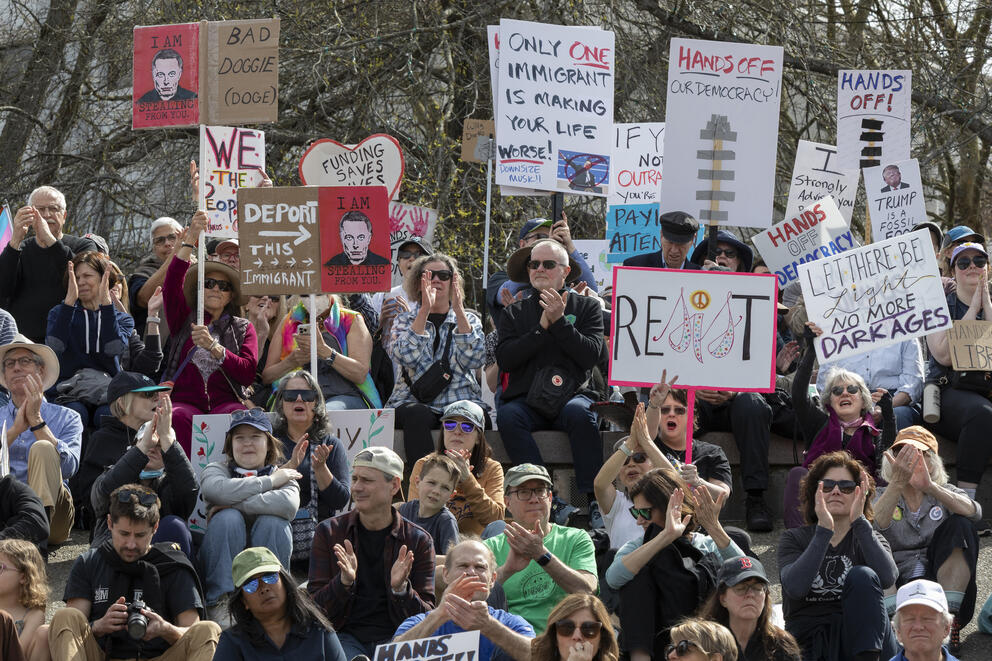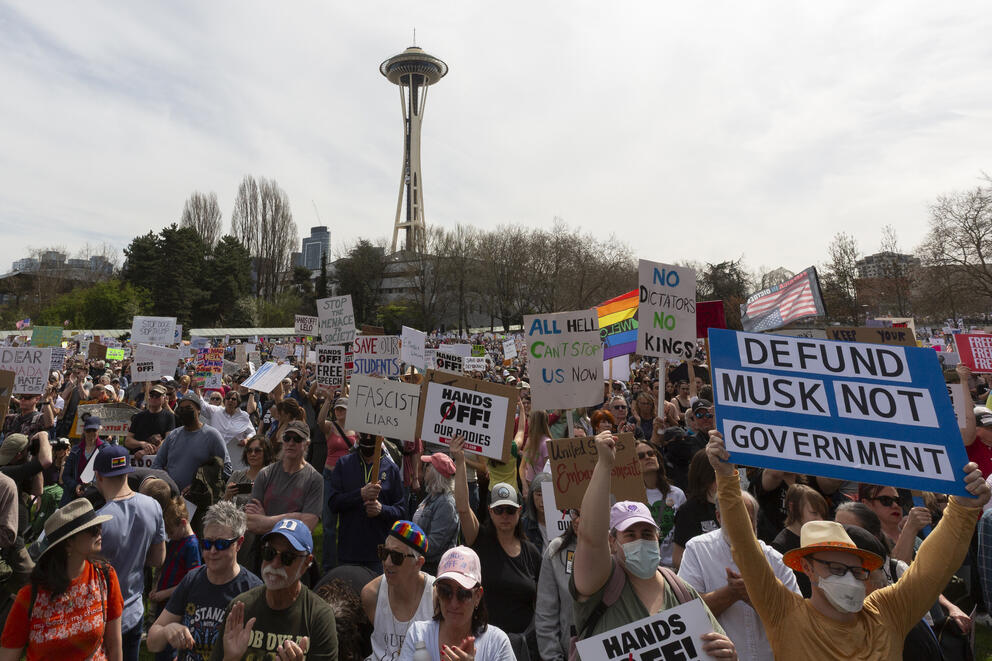The rally was one of more than 1,200 “Hands Off!” protests held simultaneously in all 50 states and overseas. The action — billed as the latest nationwide protest of President Trump’s second term so far — was organized by Indivisible, MoveOn and other progressive groups.
About half a million people RSVPd nationwide, and about 7,000 registered for the Seattle rally, organizers said. Seattle Indivisible estimated that 25,000 people attended.
People stood shoulder to shoulder in the midday sun on the lawns of Seattle Center — at times packed too close to move. Their concerns were numerous: Abortion rights. Mass deportations. Tariffs. Cuts to science and education funding. The firing of federal employees. Attacks on the LGBTQ+ community. Crackdowns on pro-Palestinian activists. Cuts to funding for Ukraine. Misinformation about vaccines. Threats to Social Security and Medicaid.
“There’s not enough room on a sign to say everything,” said Erick Heino, a Seattle resident who carried a sign in support of immigrants, transgender youth and Social Security. “This isn’t America as it should be.”
Other protesters held signs that said “Fight oligarchy,” “Hands off our democracy,” “Reject fascism,” “Tax the rich” and “We won’t be divided.” Some carried Palestinian or Ukrainian flags. Others held upside-down American flags. Cartoonish depictions of Musk — the world’s richest man who leads Trump’s Department of Government Efficiency, founded by executive order in January — seemed at times to outnumber signs depicting the president himself.
Speaking to protestors, U.S. Rep. Pramila Jayapal, D-Seattle, described the nationwide action as an effort “to take back our country” and show Trump, Musk and Republicans that “we intend to fight back against unelected billionaires.”
“Today, we are here to demand an end to this chaos and destruction,” Jayapal said.
Many protesters said they were shocked by the speed at which Trump has moved to dismantle large parts of the federal government.
“I really underestimated it could happen this fast,” said Mary Miller, a retired nurse practitioner from south Seattle. “All the services that I believe my taxes go to support have been gutted.”
Like many attendees, Miller characterized Trump as conducting a “fascist takeover.”
The rally wasn’t as large as the Seattle’s Women’s March in 2017, but attendees said they were heartened by the turnout, and hopeful that growing frustration over the administration’s actions would prompt more people to take to the streets.
“I think now people realize, just in the last two weeks, that we’ve got to get out and do things,” said Sue Nevler, Seattle resident and trustee at a local botanical garden.
Some protestors expressed frustration about a lack of urgency on the part of elected Democrats.
“They’re not fighting at all,” said Veronica Castro, an Army and Navy veteran and retired Department of Agriculture employee. “They’re just sitting on their hands.”
Castro said she wants Democrats to follow the lead of Cory Booker, a senator from New Jersey who set records last week with his 25-hour speech assailing the Trump administration.
Castro currently relies on payments from Veterans Affairs and Social Security, and said she’s worried about funding cuts.
“Getting medical care is getting harder,” Castro said. “We served our country, we’re willing to put our lives on the line and give the ultimate sacrifice, only to turn around and have them start to take away our benefits.”
The crowd included people of all ages, but it leaned noticeably older.
“I wish that there were more people our age,” said Vivian Lynn, 23. “We did try to get our friends to come, but life happens.”
Aspen Heino, 18, said they were surprised by the relatively small youth turnout. As a nonbinary person with a transgender girlfriend, Heino said they’re especially concerned about attacks on LGBTQ+ rights.
“I’m hoping that more people see things on their social media and [are] more encouraged to actually come out here and do something about it,” Heino said. “But a lot of people just feel like their voices don’t matter anymore.”
Robyn Wilkinson, 23, a recent UW student, shared a similar perspective.
“A lot of young people feel, potentially, like there is nothing they can do,” Wilkinson said. “A lot of us protested around BLM and then not a lot changed … I think a lot of people feel really helpless about the environment, and they kind of are like, well, everything’s screwed anyways.”
Wilkinson held a sign that said “Only dictators make people disappear” — a reference to Mahmoud Khalil and other foreign student activists who have been targeted for deportation by the Trump administration, and the administration’s deportation of immigrants to El Salvador citing alleged gang activity.
Wilkinson said they’re hopeful that more young people will take action.
“If you’re worried about things that are bad, if you feel really hopeless, then you have to come out here and give yourself hope,” Wilkinson said. “You have to be your own hope.”
This article was updated on 4/7 to include new crowd size estimates from Hands Off Seattle organizers.
Get the best stories of the week
This weekly newsletter dives deeper into one story and how it was reported, along with curating the best stories of the week.






